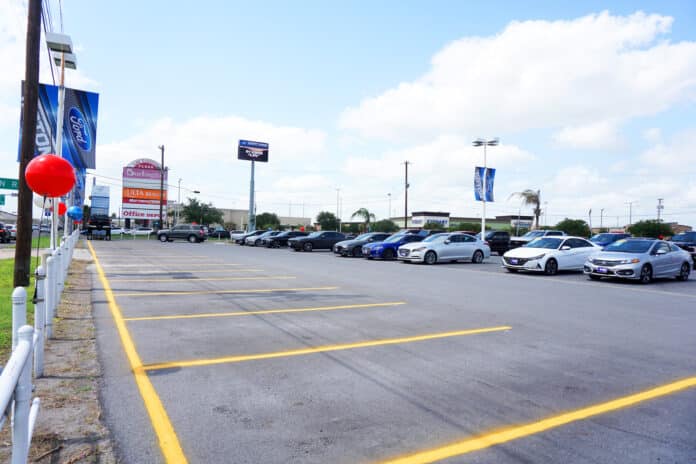
The world runs on chips these days, and anybody who doubts it might just compare new-car dealership inventories today to a year ago.

Silicon semiconductors are used in all kinds of products, including the electronic systems of new cars and trucks. Like so many other aspects of life upended by the pandemic, automobile manufacturers last year stopped ordering the chips in anticipation of a slowdown in demand for new cars due to the pandemic. But automakers weren’t the chip manufacturers’ only customers.
“Nobody knew how long it was going to last, so they passed for about 90 days on buying chips,” said Jim Tipton, president and owner of Tipton Auto Group in Brownsville. “In that process, the TV people — Panasonic, Sony and all the people that make the Xboxes and game stations — picked up all those chips, and they kept ordering.”
When car makers tried to get back into the supply chain they found themselves last in line because the electronics manufacturers had ordered up all the chips through the end of the year, he said. Tipton said it was about this time last year that his franchises started seeing new-vehicle allocations from manufacturers dwindle. Tipton Auto Group sells Ford and Hyundai, and has a partnership with Boggus Motors on a Chrysler-Dodge-Jeep-Ram dealership.
“The manufacturers were still not able to build vehicles because their plants were down, people were sick in the plants, the supply chain people got sick, so we started seeing our allocation of vehicles get squeezed,” he said. “It got smaller and smaller and smaller.”
The company’s Ford dealership went from an average of 250 to 275 new cars on the lot each month to just 30 now, Tipton said. Ford Motor Company finally started getting its hands on some chips again when the automaker’s Japanese semiconductor plant was destroyed by an earthquake in February, he said.
“That completely shut off two months worth of chips,” Tipton said. “They had enough for May, and then June or July were completely shut down. We’re not expecting any vehicles for June and July. We were already starving.”
The law of supply and demand has never shown itself more dramatically, he said, adding that he’s never seen anything like this in 42 years of selling cars. The sad irony is that, in the midst of modest inventories, the demand for new cars is raging.
“When everybody started getting healthy and everybody started getting their stimulus checks, cars started flying off the shelf,” Tipton said. “Demand was bigger than the supply, and we’ve just gotten completely run down to where we’ve got 30 on the ground, nothing coming in June and we’ll start to get a trickle in July and August.”
According to car manufacturers, a return to normalcy isn’t likely before January, he said. The good news is that Hyundai, which was its own chip supplier, and Tipton’s used car businesses have helped sustain the company through challenging times, Tipton said.
“We’ve had a really good supply of Hyundais this year,” he said. “Now just this month they’ve gotten to a point where they’ve had such an increase in sales this year they’ve run out of chips. They’re getting to the bottom of their chip barrel.”
That means that the supply of Hyundais will drop off over the next three months, Tipton said. Meanwhile, it’s a great time for people to sell their used cars, because dealers are seriously looking, he said.
“Anybody that’s got a car for sale is making great money on their car, because that’s we’ve got to sell,” Tipton said. “We’ve got to find used cars and have something to sell for the salesmen to make a living.”
Andy Hagar, chief financial officer for Cardenas Auto Group, said his company and a lot of other dealers are paying top dollar for used cars in good condition and cutting checks on the spot, which means it’s a great time for anyone considering trading up to a newer vehicle to act. Cardenas has a used car dealership in Brownsville, BMW, Mazda and Mercedes-Benz new-car dealerships in Harlingen, plus a Ford dealership in Raymondville.
Hagar said that of its four new-car franchises Ford has been affected the most by the chip shortage, while Mercedes has been “somewhat impacted.” Mazda is still sending a fair number of cars but not as many as usual, he said. Hagar noted that some domestic automakers, GM and Ford for instance, shut down their vehicle production lines in order to manufacture ventilators during the height of the pandemic when they were desperately needed.
“Once they ramp back up then all of a sudden there aren’t enough chips,” he said.
Until things get back to normal, the Cardenas group, in addition to trading briskly in used cars, is taking orders on new cars from customers who don’t mind waiting or knowing exactly what incentives will be offered, and otherwise doing what’s necessary to carry on, Hagar said.
“We still continue to move forward,” he said. “You have to be willing to adapt and adjust to the market fluctuations, product inventory, availability. We just anticipate that things will get better when the manufacturers come through.”




